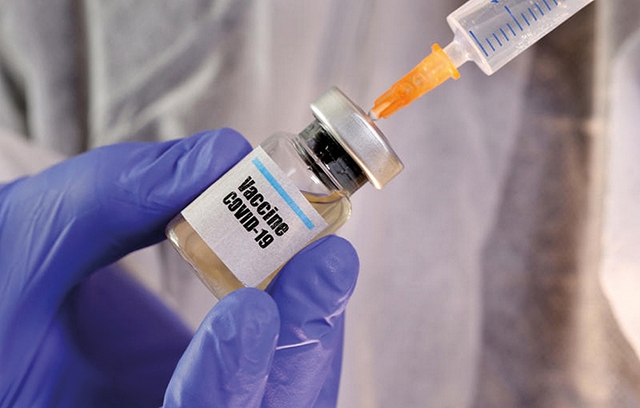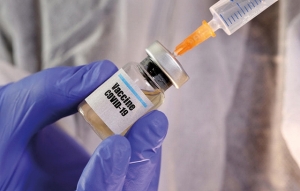The Great Anticipation: COVID Vaccines, Allergies, & the World
On Tuesday, what was hailed as a V-day, marked a historic moment when 91 year-old British grandmother Margaret Keenan was the first person to be vaccinated with the Pfizer COVID-19 jab, kicking off a mass vaccination program in the United Kingdom. Thousands of vaccinations were given across the UK on Tuesday, according to the BBC, and Mrs Keenan’s shot was the first of 800,000 doses of the Pfizer/BioNTech vaccine that will be used in the country in the coming weeks. The expectancy and hope is that by the end of the month, up to four million Britons will have been vaccinated against coronavirus. The first priorities are the elderly, those over 80, and frontline health and care workers.
Tuesday’s sense of relief seemed a bit rushed on Wednesday, when it was revealed that having received a shot the day before, two healthcare workers had experienced an anaphylactoid reaction. Both had a history of allergic reactions and carried an adrenaline auto injector on them, according to the CNN. The healthcare workers are recovering well, but their allergic reactions have contributed to common scepticism and some uncertainty about the Pfizer vaccine. Precautionary advice was given shortly after the news went public, with UK health authorities saying said that people with a “significant history of allergic reactions” (either to vaccines, medicines or foods) should not be vaccinated with the Pfizer/BioNTech shot. Allergic reactions to a vaccine are nothing new and should always be anticipated, experts noted. “The fact that we know so soon about these two allergic reactions and that the regulator has acted on this by issuing precautionary advice shows that this monitoring system is working well,” Peter Openshaw, Professor of Experimental Medicine at Imperial College London, told CNN.
Vaccine expert Dr. Paul Offit also told media that “Certainly, vaccines can cause severe allergic reactions. In the United States, roughly one in every 1.4 million doses of vaccines is complicated by a severe allergic reaction.”
He said that rather than a “blanket recommendation” for people with allergies, “the smarter thing to do would be to try and look at these two patients and see what specific component of the vaccine they were allergic to.”
The anticipated allergic reaction does not lower the efficacy of the Pfizer vaccine, according to the experts, especially since both UK healthcare staff members are recovering well.
Still, this “incident” could affect how soon the EU and the US approve the Pfizer vaccine. The UK gave temporary authorization to the Pfizer/BioNTech vaccine last week, and within hours, the European Medicines Agency (EMA) published a statement signalling more work was needed to predict the vaccination effects than the UK regulator had allowed for.
It is unsurprising that the UK beating the rest of the West to mass vaccinations would become political. Matt Hancock, the British Health Secretary, claimed the country’s fast approval is a “Brexit triumph.” However, the MHRA’s (Medicines and Healthcare Product Regulatory Agency, the executive agency of the Department of Health and Social Care of the UK responsible for ensuring the safety and accessibility of medicines and medical devices) Chief Executive, June Raine, in her letter published on December 8, made it clear that fast-tracking approval in a pandemic was an advantage of a provision that any country in Europe could use.
On Wednesday, the BBC announced the EMA (European Medicines Agency, authorizing the use of medicines across the European Union) had said that it had been hit by a cyber-attack and the documents relating to a COVID-19 vaccine had been accessed.
Expected to conclude within weeks, the EMA is currently working on approval of two COVID-19 vaccines. An investigation has been launched, and the timeline of approval of the vaccines is not expected to be affected by the attack. The hack came a day before the agency’s planned update to the European Parliament on the vaccine assessment progress.
The European Union, even with surging COVID cases, now seems to be going the extra mile for the guarantee of safety. Its approval of Pfizer’s vaccine might come as late as December 29. However, the European countries are getting their plans for vaccine distributions ready already.
The EU on Monday issued new guidelines that requires member states to modify value-added tax rates to zero, or reduce them temporarily. Both Spain and Italy have since announced that it will be free and voluntary for citizens to get vaccinated. Spain will kick off mass vaccination in January, while Italy plans to have at least 40 million people vaccinated by the first quarter of 2021.
Canada has come second in approving the Pfizer vaccine. The country now plans to have everyone who wishes to be vaccinated immunized by the end of 2021.
On Wednesday, Prime Minister Justin Trudeau announced that there will be 30,000 doses in the first Pfizer shipment due to arrive early next week, and vaccinations will start a few days later.
This probably puts extra pressure on The United States, who has yet to approve the Pfizer vaccine developed by an American company. The US Food and Drug Administration has a meeting on Thursday, likely the last step in the country’s decision to give the approval to the shot and proceed to begin shipping millions of doses. The leaders of the advisory panels have reported to the American press that the emergency authorization is very likely to come.
Some US states are already saying who will come first in immunization: Rhode Island promises healthcare workers and first responders will be first in line, with officials claiming that they ‘want to protect the protectors.’
Healthcare workers and residents who face a greater risk of infection will be the first-takers in Massachusetts too, meaning that most residents will not receive a coronavirus vaccine until at least April. Despite the number in line, however, the vaccine will be free for all, according to Govornor Charlie Baker.
In this, what Dickens would probably have called “Great Anticipations,” three of America’s former presidents Obama, Bush, Clinton, have expressed their willingness to get vaccinated in front of the cameras as soon as the shots arrive. The Great Expectations of this campaign is to raise the credibility of the vaccine in the eyes of the American public. As more time passes in the pandemic world, more Americans are reporting to be pro-vaccination. A Gallup poll released mid-November showed that 58% of the adults who were surveyed were willing to be vaccinated, up from 50% in September, as reported by the New York Times. The numbers have supposedly gone higher since then, at least, up until the allergy reaction, that is.
The race for scientific innovations between the leading countries of the world did not end in the twentieth century. The Russian Ministry of Health registered Gam-COVID-Vac, trade-named Sputnik V, a COVID-19 vaccine, back in August. Russia was the first country to approve a coronavirus vaccine for mass distribution, after testing it on a small number of people. Mass immunization has now been kicked off in the Kremlin; however, it is facing some resistance. Despite the fact that the Russian vaccine is supposed to have 86% efficacy, because of the rushed testing and authorization, not many states are willing to purchase the Sputnik V shots. Turkey announced on Wednesday that since its development lacked “good practice”, the country won’t be buying the Gam-COVID-Vac.
Vaccination prospects for Georgia, which reported over 4,600 new COVID-19 cases on Thursday morning, remain unclear. The head of National Center for Disease Control and Public Health, Amiran Gamkrelidze, said on Tuesday that COVID-19 shots would probably arrive in Georgia in March or April. The country has paid $17 million for 1,400.000 doses that will be enough to immunize 700,000 Georgian citizens, 20% of the country’s population. Gamkrelidze also said that the Foreign Affairs Ministry is currently in talks to be able to ship 200-300,000 doses of authorized shots by early February at the latest.
The start of the vaccination process has raised hopes that life will gain momentum at last. But the truth rings that the return to normal will only be possible when society as a whole gains solid protection against the virus. Once enough people are vaccinated, it will be very difficult for the coronavirus to find vulnerable people to infect. The realistic, and what now seems even optimistic view, after almost a year living in unprecedented times of global pandemic, suggests that by the end of 2021, the world will be “normal” again, whatever normal now means.
Sources: The BBC, CNN, NBC, Business-Insider, The New York Times, The Wall Street Journal
By Nini Dakhundaridze
Image source: bangkokpost.com












